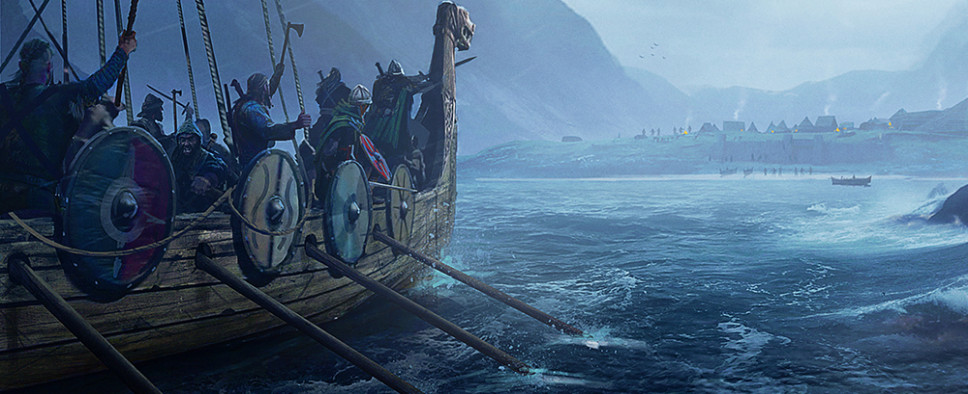Expeditions: Viking Review
-
Category: ReviewsHits: 15712

Article Index
This RPG feel is also strengthened by a more personal story. If in Conquistador you were a simple explorer and your reasons for coming to the New World were unimportant, in Viking, the entire game is based on who you are and what you have to do.
The game starts with you being appointed a thegn, or chieftain, of your village in 8th century Denmark. Your father, the previous thegn, was a notorious but less than successful raider, and after he falls in battle you have to take over and lead your dilapidated village to glory while a rival nobleman plots your downfall and attempts to make your strategically important village his own. In order to stop him, you have six months to find new allies and make your village prosperous enough for the king to acknowledge you as its rightful ruler.
Important to note is that the time limit is there mostly for story purposes and doesn't actually limit you that much. Even if you take your time and do everything, chances are you'll finish the game with a few in-game months to spare. So, if you're not a huge fan of time limits – worry not, it's not a real issue in Viking.
To save your village, you'll have to travel West, to England, where you'll be able to raid, pillage, form and break alliances, participate in the famous Lindisfarne raid, find out what exactly happened to your father, meet some Romans, and even retrace King Arthur's journey.
With that in mind, the game manages to strike a great balance between historical accuracy and introducing some fantasy elements like curses, gods, and mystical creatures, where depending on how you interpret things, you can either accept that you've been visited by Odin's alter ego Grimnir, or you can attribute your dreams of Valhalla to sharing one too many drinks with an elderly traveler.
And since the developers are themselves from Denmark and the game revolves around their country's history, the writing and the general atmosphere are quite authentic for the most part. My only complaint in that regard is that there's quite a bit of swearing in the game and the frequent f-bombs seem sorely out of place among all the crossed Os, thegns and knifrs.
As you explore the Kingdom of Northumbria and its surrounding areas, you'll visit plenty of towns and forests, get to see Hadrian's Wall and traverse a swamp or two in the process. All these locations are filled with NPCs, enemies, quests, and loot.
And while every other part of Viking's exploration ranges from great to at least serviceable, looting is actually tedious and not fun. It seems like wherever you go, there's some barrel or crate you can rummage through and oftentimes they have valuable but extremely boring things inside. You're incentivised to loot everything, but it's extremely tedious to click on what seems to be hundreds of objects per map and get oils, ropes, and random pieces of scrap. You can use it all, and some of it is quite valuable, but the activity of looting is mindlessly mechanical and pretty much the definition of boring.
As for the quests, while they can be interesting from a historical standpoint, the writing is pretty good, and the amount of unexpected reactivity is pleasantly surprising, the actual part where you do them mostly consists of going to a location marked by a quest marker and either fighting or talking to someone. A few quests do break this mold but there aren't enough of them to tip the scales into the “great quest design” territory.
Camping, on the other hand, a feature many disliked in Conquistador, is now a more engaged process and a much less frequent one, so if you didn't enjoy camping before, there's a good chance you'll find Viking's take on this system much less disagreeable.
Also, another thing that's probably only relevant to those who played Conquistador, is how similar Viking's main story is to its predecessor. Strip away the viking aesthetic, forget about the other vikings that try to thwart your attempts at finding riches and glory at every opportunity, and you're left with a story that revolves around a couple of rival factions (Picts and Northumbrians in Viking's case). You can help them both until a certain point where you have to support one of them or decide to play them against each other, and when they're both weakened, swoop in and take their lands for yourself. This is almost exactly how Conquistador's story developed and I don't really get the logic behind Logic Artists' decision to repeat the same thing twice.
Combat
The combat, on the other hand, went through a lot of welcome changes. Sure, you're still fighting in a turn-based fashion on a hex grid, but since you're not limited to a few pre-determined classes and there are significantly more skills now, you have a lot more flexibility in what you can do.
And the most amazing thing here is that you have plenty of viable ways to approach encounters and pretty much every weapon, skill, or strategy can be useful. In Conquistador my battle party consisted of a single healer, one tanky character, and a bunch of mobile high-damage scouts who could quickly surround the enemies and deal with pretty much everyone in a single turn. I experimented with other setups but they all felt useless in comparison.

